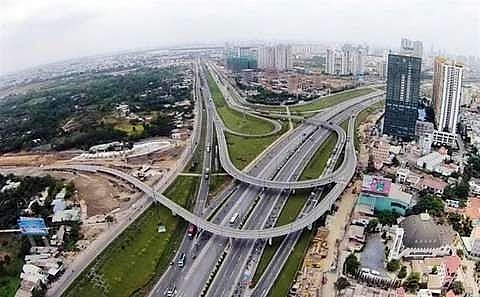Vietnam eyes private investment in infrastructure projects
 |
| Developing the infrastructure system was identified one of three breakthroughs in Vietnam’s socio-economic development strategy, besides institution reforms and human resource development. - Photo baogiaothong.vn |
Speaking at a workshop on infrastructure development, financing and governance in Asia, Thang said the Vietnamese Government had paid special attention to promoting private investment, especially via the public-private partnership (PPP) model, in recent years.
He cited statistics that Vietnam has attracted 147 PPP projects worth a total VND1.14 quadrillion (US$52 billion), contributing significantly to improving infrastructure in the country.
“Private investment has been and will continue to be an important resource in the future, given the limited Government budget for public investment,” Thang stressed.
Developing the infrastructure system was identified one of three breakthroughs in Vietnam’s socio-economic development strategy, besides institutional reforms and human resource development.
However, Vietnam still faces several challenges in the process.
Thang pointed out that because the size of the economy was not large and resource accumulation ability was limited, maintaining a high level of investment from the State budget would put pressure on the macro-balance and overall development.
In addition, Vietnam is a middle-income country, meaning low-cost loans from foreign countries for infrastructure would be scarce and the country must borrow at higher rates.
Efforts were also needed in institutional reforms to improve the investment climate and raise private resources for infrastructure, Thang stressed. Other challenges included the lack of a proper mechanism for implementing PPP projects, such as providing guarantees for investors and risk sharing mechanisms.
As several large infrastructure projects are underway in Vietnam, such as the North-South Expressway, Long Thanh International Airport and high-speed North-South railway as well as climate-change adaptation irrigation projects, Vietnam needs to complete a legal framework for attracting private investment.
Thang said at the workshop’s sideline interview that a law on PPP was being compiled and was set to be passed in 2020, a move expected to create a firm legal framework to attract private capital, from both domestic and foreign investors, to develop infrastructure.
In addition, the Government hopes to enhance the transparency of PPP projects to attract capital, Thang said.
According to Kunio Umedia, ambassador of Japan to Vietnam, Vietnam needs to find different resources to finance infrastructure development projects.
He said Japan pledged to support Vietnam in infrastructure development, urging the Vietnamese Government to improve public debt management and use capital more efficiently.
All infrastructure development projects must be managed properly to improve economic efficiency, he added.
At the workshop, participants also discussed PPP trends in Asia, frameworks for better PPP governance and recommendations for Vietnam to enhance infrastructure investment efficiency.
Also on the agenda of two-day VEF, which was organised by the Central Economic Commission and the International Monetary Fund, is a high-level policy dialogue about Vietnam’s economy 2018 in review and plans for 2019 – strengthening the fundamental drivers for rapid and sustainable growth, which will take place today.
In addition, experts also discussed climate change adaptation and energy security for sustainable development and digital economy development in the context of Industry 4.0.
VEF has been held annually from 2017 to provide a valuable and timely exchange platform for various stakeholders including the Government, policymakers, academics, businesses and international organisations to debate initiatives, practices and trends for sustainable development.
What the stars mean:
★ Poor ★ ★ Promising ★★★ Good ★★★★ Very good ★★★★★ Exceptional
Related Contents
Latest News
More News
- Hermes joins Long Thanh cargo terminal development (February 04, 2026 | 15:59)
- SCG enhances production and distribution in Vietnam (February 04, 2026 | 08:00)
- UNIVACCO strengthens Asia expansion with Vietnam facility (February 03, 2026 | 08:00)
- Cai Mep Ha Port project wins approval with $1.95bn investment (February 02, 2026 | 16:17)
- Repositioning Vietnam in Asia’s manufacturing race (February 02, 2026 | 16:00)
- Manufacturing growth remains solid in early 2026 (February 02, 2026 | 15:28)
- Navigating venture capital trends across the continent (February 02, 2026 | 14:00)
- Motivations to achieve high growth (February 02, 2026 | 11:00)
- Capacity and regulations among British areas of expertise in IFCs (February 02, 2026 | 09:09)
- Transition underway in German investment across Vietnam (February 02, 2026 | 08:00)

 Tag:
Tag:



















 Mobile Version
Mobile Version